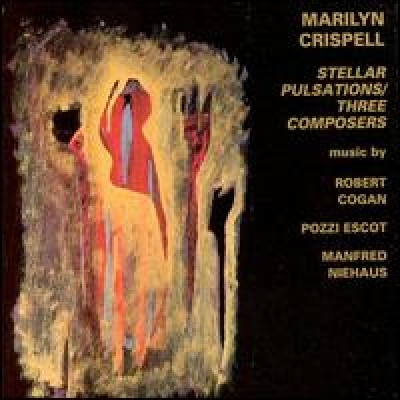
Stellar Pulsations/Three Composers
by Thom JurekThe three works included here are by three composers who have written these works especially for Marilyn Crispell. The first, by Robert Cogan, is a work for two pianos -- one improvising and one, played by Ellen Polansky, playing a notated score -- and is so curious in its construction that it is difficult to decide which pianist is playing what. The score runs all over the map in both time signature and in harmonic construction. It takes a few minutes to discover, because of the similarity in their approaches, Crispell's particular voice as a pianist. Her phrasing comes from outside both the jazz and classical realms -- at least where the piano is concerned. Hers is a percussive shattering of silence, lightning quick runs and astonishing dexterity in both physical movement and musicological strategies. She plays to the score as if in front of a mirror. Counterpoint, the original M.O. seemingly disappears after two of the work's 19 minutes. Silences play off each other in stuttered language, collapsing into rushes and splatters of sound where both pianos attempt to reach a kind of resonance in the dissonance and at times do. The chamber piece that follows, "Mirabilis II," is by Pozzi Escot, the only woman of this trio of writers. She bases her score on a work from Hildegard von Bingen's antiphon "O Quam Mirabilis" and quotes its score in the beginning of the work. Accompanying Crispell in performance are Don Byron on clarinet and longtime collaborator, drummer Gerry Hemingway. What appears to be a meandering interplay among the trio in the first movement becomes, by its last, a startling and swinging free jazz workout that is as far from spiritual reverence as a whorehouse from a cloister. It is easily the most satisfying thing here. The last work, "Concerto for Marilyn," was written by Manfred Niehaus, and performed by Crispell with the WDR Orchestra, conducted by David de Villiers. Each movement is constructed -- and named for -- one of the Marx Brothers, featuring Crispell with other orchestra members sprinting around a score that is littered with loose ends and messy encounters. One has to wonder why a conventional jazz quartet wouldn't have sufficed when so little of the actual orchestra was used. Indeed, only the soloists know for sure. Crispell is gracious and laid-back in this work, seemingly unsure where she fits in the slapstick maelstrom. A disc like this was bound to be a mixed bag, and it is. But Crispell's playing, is, as always, even when restraining herself, exceptional: deep, solid, graceful.
